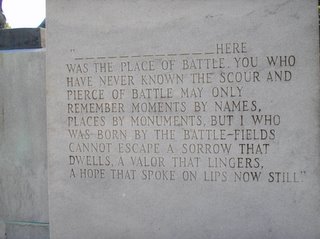
I think this is so interesting. As a writer it’s even more interesting.
Sunday Kenya Times
Focused, Intelligent and Modern
By Charles Njoroge
Dressed in a stripped navy blue suit, skirt and blouse, with well fitting closed shoes, she has a fancy necklace, sparkling earings, bracelets and rings all in excellent synchrony. She calmly sits in her office at Makini School cutting the image of a confident, composed and serious woman.
“Yes, I have to reorganise myself. Losing a husband is like losing one limb of your body and it takes time for one to adjust to doing with the remaining limp,” says Mrs Elizabeth Mary Okelo, Executive Director of Makini Schools.
Her office is neatly decorated with flowers and a well-spread carpet. It has executive furniture, with files well arranged in the cabinets. The portraits of her late husband are strategically placed on her table. A quick glance at the wall tells it all – certificates of the awards she won both in local and international forums.
Her latest achievement came this month when she received a certificate of ‘Fellow of the Institute of Bankers.’ This is the highest honour in the banking sector.
She takes pride in her achievements, and above all when her school excels in academics. I feel honoured and privileged for the awards I have won, and I thank God for that. My pride is to see Makini students excel in academic and general life. I will remain committed to the school and see that we remain at the top,” she says.
Mrs Okelo cuts the image of an intelligent, focused and modern woman. Her grooming, speech and choice of topics tells it all. A woman who has intimate grasp of issues. Her beauty, elegance and way of dressing can not be ignored.
I jokingly ask her the secret behind her beauty. She laughs and explains that it’s all because of regular exercises.
She maintains a friendly, social, jovial and down to earth mien. These are some of her notable attributes.
The lady creates an inspiring atmosphere for an interview, remains a keen listener and answers questions posed to her in an intelligent way. She talks much about her family, which she says has been supportive and very close to her.
“Just look around, at least every year we meet and take photographs,” she points at some photographs hanging on the wall in her office. She smiles broadly as she talks of her brothers like the Vice President Moody Awori. “My brothers are outgoing, humble and dignified. All of them have a role to play in the society, for instance, you can see one busy selling bananas.”
Mrs Okelo says she is lucky to be born in a privileged family and has had a rewarding experience in her life. “I thank God because I have had a good life, I have enjoyed my childhood and marriage life,” she says.
Then she talks about her childhood ambition, to study psychology but was discouraged by her parents. “They questioned where I would be employed and that discouraged me.”
She does not fail to acknowledge her late husband whom she says was a great man, humble, dignified and God fearing. “He was my mentor and my teacher. We prayed together and shared a lot in life.”
Managing Makini Schools without Dr Okelo has been a challenge as she admits. However, she appreciates the support she gets from her family, friends, teachers, parents and students. Her son Joseph helps with administrative duties at the school. “In fact teachers, parents and students have worked extra hard even after the demise of Daktari. We hope that we will continue excelling,” she says with a sense of confidence. It is out of such commitment that saw the school took first position during 2004 KCPE.
Asked what is behind Makini’s success, she discloses that they put God first, read widely and work extra hard. She also notes that her relations with the parents, teachers and students remains intact.
Like any other person, she has her role models. They include Dr Edward Owour of Ministry of Repentance and Holiness, the World Bank Country Representative, Dr Collins Bruce, and his wife Prof. Levrne Bruce. “Look, these are young people who are professionals, talented and have given their lives to God. They preach holiness and Christian values,” she observes.
She stresses that serving the community and caring for the less privileged comes to her naturally.
Back as a young girl growing up in the village, she learnt to associate herself with and care for the less privileged. “My love for children remains passionate and it is out of this that I came up with the idea of establishing Makini Schools – to give them quality education, serve and care for them.”
She becomes so attached to her faith and says she has learnt to live and emulate Jesus Christ.
In every statement she makes, she does not fail to mention the name of God and says that as a dedicated Christian, she believes God has a plan for every individual. “When I look at an individual, I look at him or her as a human being and not at his financial background.” She adds: “Material things are not as important as spiritual values. If anything, all of us are equal before God.”
She talks about qualities she likes and dislikes in human beings. “I hate people who are proud and arrogant, thinking that they have achieved everything by themselves. I like and strongly believe in hard-work, honesty and transparency,” she says.
Her busy schedule sees her wake up as early as 4.30 am to pray and read the Bible, which she says she is currently studying. She reports to her office at 8.00 am. The little time she has to spare is spent to read widely, especially gospel materials. Most of her day is spent in meetings or undertaking her usual administrative duties at the school.
Her professional background is itself rich and overwhelming. Mrs Okelo, is an accomplished banker. In fact, she is the first woman bank manager in the country. She is also an educationist, entrepreneur and a gender rights crusader. She boasts of vast and diverse experience in local and international finance, micro-enterprise and international service in the public, private and NGO sectors.
Mrs Okelo served as the first woman advisor to the president of the African Development Bank (ADB). She was also the founding chairperson of the Kenya Women Finance Trust. She was also consultant to the Vice President of Uganda on establishment of Centres of Excellence in Africa among others.
She has been able to win many awards locally and internationally among them SHE Tribute Award, International Educator of the Year Award, and Presidential Award – Moran of the Burning Spear – for her contribution to education development in the country.
Mrs Okelo does not fail to acknowledge other women achievers, some of them who she says were her classmates in high school. “We were a class of 13 student pioneers of ‘A’ levels at Alliance Girls High School, and all of us have succeeded in life. ” She singles out Lady Justice Effie Owour – the first lady justice in Kenya, Prof Frida Karani – former Deputy Vice Chancellor University of Nairobi, and Elizabeth Masiga – former Permanent Secretary.
Her greatest challenge remains the agony and pain she is undergoing after losing her beloved husband. “It is my greatest challenge, losing somebody so suddenly. I am trying to come to terms with such a great loss.”
Born in Nambale, Busia District, Western Province, she says she comes from a large family of 17 children, 10 boys and 7 girls, some who died. Her parents were Canon Jeremiah Awori, who was a pastor and Mariam Awori who was a teacher and a nurse.
She says she was brought up in a strong Christian family and was taught all the fundamental values of Christianity. “My parents were dedicated Christians and strict disciplinarians. They taught us responsibilities and nurtured our individuality,” she says.
The family, as she narrates, has some key personalities in the society. She talks about her elder brother Wycliffe W. Awori who was a freedom fighter, the late Prof Nelson Awori who was the first African to perform a kidney transplant; Vice President Moody Awori; Hon. Aggrey Awori, who is an MP in Uganda among others.
When asked to comment about her wealth, she dismisses it saying: “I am rich spiritually, and do not bother much about material things. My grandfather was the one who was rich. He was a hunter and engaged in ivory trade.”
At one point, she resorts humour when she says her parents would instruct them to work yet they had many workers at home. “We were not given any special treatment and that never made us lesser of human beings. We were treated like any other children in the village.” She continues: “By then there were no special homes and schools for the disabled. These people would be brought home and we would be asked to take care of them.”
She attended Nambale Primary School for her primary education, before joining Butere Girls High School and later Alliance Girls High School for her ‘O’ and ‘A’ levels. She later joined Makerere University of East Africa, where she did her BA in History, a field that was considered as male domain. She also has a post-graduate Diploma in Early Childhood Education from Froebel College Dublin, Ireland and a Diploma from Institute of Bankers in London.
While in London, she got engaged to the late Dr. Pius Okelo who was then studying for his Doctorate of Philosophy degree in Electrical Engineering at Imperial University of London and graduated with a first class honours degree. They got engaged and married in 1968. They have been blessed with three children Joseph who holds a Masters and Bachelor of Arts first class honours degree; Lawrence who has a Masters and Bachelor of Arts first class honours degree in mechanical engineering; and Clare, a medical doctor who has also studied philosophy. Her two sons are married and have children. Clare is engaged to Alistar, an electronic engineer.
“I have four grandchildren who are the joy of my life. I enjoy every minute I spent with them playing and singing together,” she says with a smile.
And for young girls who aspire to take after Mrs Okelo, she advises them to work hard, have a vision in life and above all trust in God.
 And how does UW know what constitutes a top notch day care? Are they in the business of education now? Everyone wants to climb the mountain of critics and expound and point fingers and pontificate, but few people get in the trenches and stay there. Maybe there are too many critics and not enough compliments.
And how does UW know what constitutes a top notch day care? Are they in the business of education now? Everyone wants to climb the mountain of critics and expound and point fingers and pontificate, but few people get in the trenches and stay there. Maybe there are too many critics and not enough compliments.







